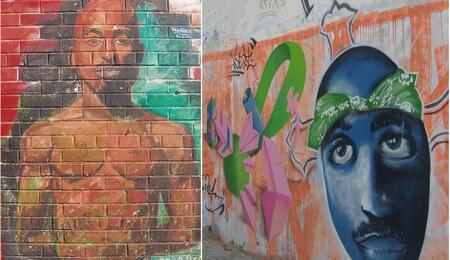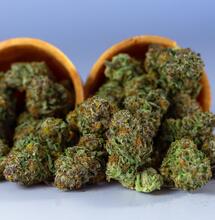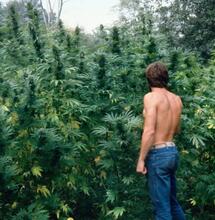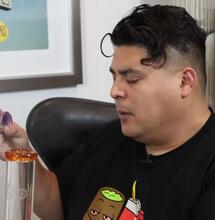Tupac Shakur's Legacy Lives On

With over 75 million records sold around the globe, Tupac Shakur is one of the most prolific music artists of the 20th century. His tragic death, on this day in 1996, has consolidated his well-earned place in music and cultural history. Tupac's life has been detailed in numerous documentaries and books, some focusing on the events that led to the abrupt end of his life, others on his rivalry with Biggie, and so forth. In 2017, 2Pac was inducted into the Rock and Roll Hall of Fame. But beyond his success as an artist, Shakur's life and upbringing epitomize a generation of African Americans.
In 2020, during the Democratic presidential campaign, Sen. Kamal Harris revealed she had smoked pot back in college. The interview aired on the radio program The Breakfast Club on Monday. One of the follow-up questions Harris received was whether anything was playing in the background as she would take a hit from the joint. Her answer went without much thinking: "Oh yeah, definitely Snoop. Tupac for sure," she said.
It's now been 26 years since Tupac Shakur's death. His legacy lives on with his fans and with everyone who has, at some point, been in touch with his music. But more than that, Tupac Shakur represented a generation of Black people who were at the epicenter of the notorious War on Drugs, who suffered record high unemployment, and for whom street violence and dangerous drugs were part of everyday life.
To truly know 2Pac and where his music as well as his public persona derived from, is to know the struggle of black communities throughout the 1970s and 1980s.
The legendary rapper was born in 1971, in the early days of the post-civil rights era. His mother was Afeni Shakur, a prominent member of the Harlem chapter of the black power political organization Black Panther. At the time, the FBI viewed the Black Panther as "the greatest threat to national security." Afeni's involvement with the party would cost her time in jail. After being acquitted of all charges and regaining her freedom, she would give birth to Tupac, his birth name being Lesane Parish Crooks. The birth year of 2Pac was also when President Nixon initiated the notorious War on Drugs.
Like millions of other African-Americans who grew up in those days, Tupac's life was defined by the systematic repression of black activists and the War on Drugs.
2Pac grew up in a time when the New York underground harbored heroin addicts just as much as it served as a means of transport. Crimes rates soared to a record high, with black communities disproportionately affected by all the violence raging around.
In a desperate bid to tamper down illegal drugs, the state of New York introduced draconic sentences for everyone caught carrying narcotics. Having four ounces of illicit drugs on your person was punishable with a minimum sentence of 15 years and sometimes a life in prison. Tupac's own mother became a crack cocaine addict.
By the early 1980s, the level of unemployment in black communities reached that of the Great Depression. Police brutality and corruption were synonymous with black neighborhoods. What black activists of the era asked for were fundamental things: more jobs, better health care, and putting an end to police brutality — none of which were provided.
These would be the defining experiences of a generation who would seek music, in particular rap music, to express a political statement, to disobey and blast the anger. Hip-hop acts such as Public Enemy, Ice Cube, X-Clan, and others, promoted resistance through music, bringing a radically different sentiment than pop music in those days. Through their lyrics, rappers would openly resist the illicit drug trade, police brutality, and white supremacy.
Tupac's first LP, "2Pacalypse Now", released in 1991, jumps on the same bandwagon. His songs directly confronted the mass incarceration black people were subjected to, all the violence, drugs, and unfair treatment.
His best-known tune, "Changes," makes similar statements:
Cops give a damn about a negro
Pull the trigger, kill a nigga, he's a hero
Give the crack to the kids, who the hell cares?
One less hungry mouth on the welfare
Tupac struggled as his popularity grew and his music went mainstream. He would battle the allure of conspicuous consumption, excess, and sexism. He personally found himself involved in violent criminal rings, with assault charges brought against him twice, in 1993 and 1994. In March of that same year, he was robbed and shot five times in the lobby of the recording studio he used in New York, right before he was sentenced on sexual assault charges.
2Pac served nine months of his sentence at the Clinton Correctional Facility. He was released on $1.4 million bail and was killed in a Las Vegas drive-by shooting just a month short of his release from the New York prison facility. The legendary rapper was aged only 25 at the time.
Today, 2Pac's legacy lives on. He is an inevitable part of the hip-hop culture which has since entered academia and cast new names who today speak to a new generation of African-Americans.
Today's anniversary of Tupac's death is also the perfect time to roll a joint in his honor and play "Changes" once again or else from his rich repertoire of music.
We gotta make a change
It's time for us as a people to start makin' some changes
Let's change the way we eat
Let's change the way we live
And let's change the way we treat each other
You see, the old way wasn't workin'
So it's on us to do what we gotta do to survive








